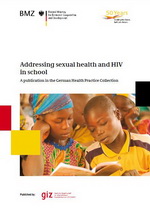Addressing sexual health and HIV in school
Four initiatives from Sub-Saharan Africa and Latin America
Writer:
Andrew Wilson
Peer reviewers
- Christopher Castle, UNESCO
- Regina Görgen, indepent consultant
Published by Deutsche Gesellschaft für Internationale Zusammenarbeit (GIZ) GmbH, November 2011

Social and cultural factors (taboos, traditions, mistaken beliefs) as well as behavioural ones, combined with insufficient information or basic sex education, make young people one of the sections of the population most exposed to HIV infection, as well as to unwanted pregnancies and sexually transmitted diseases. But they are also the “life force” and the future of their country, and high levels of HIV severely threaten a country’s prospect for social and economic development. Young people need education and information that is adapted to their age, culture, and areas of interest. Equally important, they need people and structures able to support them, advise them, and give them adequate backing. Schools are an ideal place to reach them in ways that can help them understand and change risky behaviours. This publication describes the approaches of four German-supported initiatives in Africa (specifically in Guinea, Mozambique and Tanzania) and Latin America (a regional initiative that includes Argentina, Brazil, Chile, Paraguay, Peru and Uruguay).
